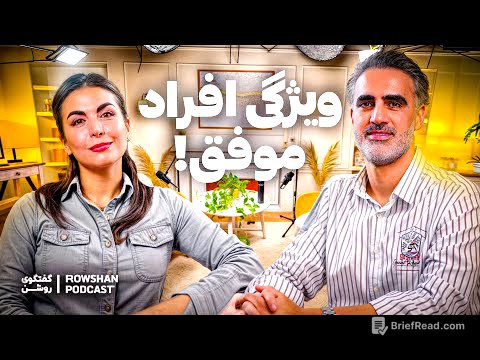TLDR;
This YouTube video features a lecture on land law in Ghana by Justice Dennis Dominic Adjei. The lecture covers various aspects of land ownership, acquisition, and rights, including allodial title, customary law freehold, common law freehold, usufructuary interest, leasehold interest, and customary tenancy. It also addresses the legal framework governing land acquisition by citizens and non-citizens, compulsory acquisition by the state, and the management and alienation of stool, skin, and family lands. The lecture further discusses other modes of land acquisition such as purchase, gifts, prayer, and mortgages, as well as rights associated with land, including licenses, easements, and profit a prendre.
- Definition of land and applicable laws in Ghana
- Distinction between citizens and non-citizens in land ownership
- Types of land interests and their acquisition
- Customary law vs. custom
- Land alienation and capacity
- Other modes of land acquisition
- Rights associated with land
Introduction and Guest Speaker Introduction [0:02]
The host introduces Justice Dennis Dominic Adjei, a respected legal expert and author on Ghanaian law, as the guest speaker. Justice Adjei's works have been cited by the Supreme Court and other superior courts. He is a fellow of the Ghana Academy of Arts and Sciences and the Director of the Judicial Training Institute. He has also been honored by the Catholic Church. The host expresses gratitude for Justice Adjei's presence and anticipates his insights will be valuable for students preparing for examinations.
Welcome and Introductory Remarks by Justice Adjei [5:52]
Justice Adjei expresses his pleasure at being invited to assist in the tutorials. He acknowledges the passing of Mafusang, the previous director of the Judiciary Training Institute, and transitions to the topic of land law in Ghana.
Definition of Land and Applicable Laws [5:58]
Justice Adjei explains that the definition of land includes the earth and everything on it, including rivers and water bodies. He notes that land law in Ghana is derived from several sources, including statutes of general application, common law, and customary law. He emphasizes the importance of the Supreme Court Ordinance of 1876, which incorporated English statutes, common law, and equity into Ghanaian law.
English Statutes of General Application [7:31]
Justice Adjei clarifies that certain English statutes, such as the Trustees Act of 1539 and the English Property Act of 1925, continue to be part of Ghanaian law under the Courts Act. He notes that only specific sections of these acts are applicable.
Constitutional Provisions on Land Ownership [9:07]
Justice Adjei discusses the constitutional provisions related to land ownership, including the right to acquire property (Article 18) and the government's power of compulsory acquisition (Article 20). He explains that compulsory acquisition requires fair and prompt compensation.
Citizens vs. Non-Citizens in Land Ownership [10:22]
Justice Adjei highlights the constitutional distinction between citizens and non-citizens regarding land ownership. Non-citizens cannot acquire freehold interests and are limited to leaseholds not exceeding 50 years at any one time, as per Article 266.
Interest in Land vs. Right Over Land [11:33]
Justice Adjei differentiates between an "interest in land" and a "right over land." An interest in land implies ownership, while a right over land does not.
Types of Land Interests in Ghana [12:21]
Justice Adjei identifies six types of land interests in Ghana:
- Allodial title
- Customary law freehold
- Common law freehold
- Usufructuary interest
- Leasehold interest
- Customary tenancy
Allodial Title [13:21]
Justice Adjei describes allodial title as the highest or ultimate interest in land, traditionally acquired by a stool, skin, clan, family, or individual through conquest, pioneer discovery, gifts, purchase, or agreement. He explains that a stool is a corporate sole with the capacity to own and alienate land.
Acquisition of Allodial Title by Stools and Skins [15:34]
Justice Adjei details how stools and skins traditionally acquired land through conquest and settlement, pioneer discovery, gifts, purchase, or agreement. He notes that pioneer discovery often involved hunters identifying virgin land for settlement.
Acquisition of Allodial Title by Families and Individuals [16:59]
Justice Adjei explains that families and individuals could also acquire allodial title through discovery, gifts, purchase, or agreement, though not through conquest. He notes that the state can now acquire allodial title through compulsory acquisition, gifts, and purchase.
Compulsory Acquisition and Expropriation [18:01]
Justice Adjei distinguishes between compulsory acquisition and expropriation, emphasizing that the Ghanaian constitution requires fair and prompt compensation for compulsory acquisition. He clarifies that the High Court has exclusive original jurisdiction in cases of disputes over compensation for compulsory acquisition.
State Ownership of Land [20:02]
Justice Adjei states that the state owns about 20% of the lands in Ghana through compulsory acquisition. He explains that when the government acquires land, it pays for the allodial interest and any lesser interests.
Land Act and Compulsory Acquisition [20:38]
Justice Adjei references Section 2 of the Land Act, noting that compulsory acquisition has become a means for the state to acquire allodial interest.
1969 Constitution and Non-Citizen Land Ownership [20:55]
Justice Adjei addresses the 1969 Constitution's impact on non-citizen land ownership, explaining that it converted freehold interests held by non-citizens into leases of a maximum of 50 years. He notes that the 1992 Constitution reaffirmed this position.
Customary Law Freehold and Common Law Freehold [24:31]
Justice Adjei introduces customary law freehold and common law freehold, explaining that they are derivative interests originating from allodial title. He clarifies that the Land Act distinguishes between customary law freehold and usufructuary interest.
Customary Law Freehold: Acquisition and Characteristics [25:26]
Justice Adjei defines customary law freehold as an interest derived from allodial title, acquired in accordance with customary law. He distinguishes between custom and customary law, explaining that customary law is a custom enacted into law or judicially pronounced by a superior court. Customary law freehold is perpetual, alienable, and inheritable.
Common Law Freehold: Acquisition and Forms [31:07]
Justice Adjei defines common law freehold as an interest acquired absolutely in accordance with common law, with perpetual duration. He explains that common law freehold exists in three forms: fee simple (absolute), fee tail (subject to conditions), and life interest (duration limited to the life of the holder).
Companies and Land Acquisition [34:18]
Justice Adjei discusses land acquisition by companies, noting that the Land Act defines a company as non-Ghanaian if more than 40% of its equity or ownership is held by non-citizens. Such companies cannot acquire interests exceeding 50 years.
Usufructuary Interest: Acquisition and Characteristics [36:44]
Justice Adjei defines usufructuary interest as the right to cultivate land as a subject of a stool, skin, or member of a family holding allodial title. Under the Land Act, usufructuary interest can be acquired through inherent rights with express permission or through settlement with permission for at least 50 years. It is inheritable and alienable, but alienation by non-indigenes requires written consent from the allodial title holder.
Leasehold Interest: Definition and Implied Covenants [41:36]
Justice Adjei defines leasehold interest as an interest limited by time, created when a holder of allodial title, customary law freehold, common law freehold, or usufructuary interest grants a lesser interest for a specific period. He explains the roles of the lessor and lessee and mentions implied covenants between them, as found in Sections 50 and 51 of the Land Act.
Implied Covenants and Usufructuary Interest [45:26]
Justice Adjei discusses the implied covenants and how the Land Act has modified the old law regarding the alienation of land occupied by a usufructuary interest holder. Now, the allodial title holder can sell the land for expansion or community interest, but must compensate the usufructuary holder with 40% of the proceeds or market value.
Customary Tenancy: Definition and Modernization [47:27]
Justice Adjei defines customary tenancy as tenancy regulated by custom and accepted as law, traditionally involving the sharing of farm produce. He notes that Section 7 of the Land Act has modernized customary tenancy, allowing agreements on rent, sharing of produce, or physical partition of farmland.
Infants and Land Acquisition [50:15]
Justice Adjei clarifies the definition of "infant" in land law, stating that it refers to a person under 18 years old, as defined by the Land Act. He explains that individuals under 18 cannot acquire land in their name but can do so through a proprietor holding the land in trust.
Capacity to Alienate Stool Lands [52:58]
Justice Adjei discusses who can alienate stool lands, stating that alienation by the occupant of the stool alone or the eldest of the stool alone is void. A valid alienation requires the occupant of the stool with the consent and concurrence of the elders of the stool.
Alienation of Stool Lands and the Assumin Case [55:37]
Justice Adjei references the "Appiah v. Assumin" case, clarifying that alienation of stool land requires the consent of the occupant of the stool and a majority of the elders. He also notes that a person responsible for a town cannot alienate land without authorization from their overlord.
Alienation of Stool Lands When the Stool is Vacant [57:21]
Justice Adjei explains that when a stool is vacant, alienation can be made by a regent or caretaker appointed by the elders, with the necessary consent.
Alienation of Family or Clan Lands [58:55]
Justice Adjei discusses the alienation of family land, stating that it must be done by the head of the family with the consent and concurrence of the principal members. He notes that alienation by the head of the family alone is voidable, not void.
Maintaining an Action in Respect of Stool and Family Lands [1:02:46]
Justice Adjei explains that a stool, as a corporate sole, can sue and be sued. He notes that the head of the family typically sues and is sued on behalf of family land, but there are exceptions where a principal member may sue, as established in the "Quan v. Yenni" case.
Other Modes of Land Acquisition: Purchase [1:06:56]
Justice Adjei discusses other modes of land acquisition, including purchase, which is now regulated by the Land Act. He notes that purchasers must be at least 18 years old and that the court is interested in market value when considering the validity of a sale.
Other Modes of Land Acquisition: Gifts [1:10:25]
Justice Adjei discusses gifts as a mode of land acquisition, differentiating between the donor and the donee. He emphasizes the importance of "aseda" (thanksgiving) for customary law gifts, citing the "Bonnie v. Bonnie" and "Yoguo v. Egyiri" cases.
Irrevocability of Gifts and Exceptions [1:13:52]
Justice Adjei explains that a gift is generally irrevocable, but a gift from a parent to a child can be revoked at any time, unless the child has substantially developed the property, in which case revocation may amount to unjust enrichment, as seen in the "Kofi Tabiri" case.
Common Law Gifts: Advancement [1:17:18]
Justice Adjei introduces common law gifts, known as advancement, which occur when a man buys property in the name of his child or spouse. He explains that this creates a presumption of advancement, making the gift irrevocable, though it can be rebutted under specific circumstances.
Rebutting the Presumption of Advancement [1:22:23]
Justice Adjei explains that the presumption of advancement can be rebutted if there is evidence that the man declared before or contemporaneously with the purchase that the property was not intended for the child or spouse.
Rights Associated with Land: Licenses [1:27:32]
Justice Adjei transitions to discussing rights associated with land, including licenses, which are permissions granted by a person with an interest in land. He distinguishes licenses from easements and profit a prendre and notes that a trespasser can maintain an action against everyone except the true owner, subject to the Limitation Act (NRCD 54).
Easements: Definition and Elements [1:32:34]
Justice Adjei defines easements as common law rights, such as rights of way or light, that benefit one property (dominant tenement) at the expense of another (servient tenement). He outlines the elements of easements, including the requirement for adjacent lands owned by different persons and the necessity of access or light.
Profit a Prendre: Definition and Requirements [1:36:35]
Justice Adjei defines profit a prendre as a right to take property from another person's land, provided that the property is capable of being owned.
Other Modes of Acquisition: Prayer [1:39:01]
Justice Adjei discusses prayer (pledge), a common law transaction where someone provides their land for use in exchange for money, with the understanding that the land will be returned upon repayment. He notes that prayer is perpetually redeemable and that limitation does not apply.
Mortgages: Definition and Characteristics [1:43:52]
Justice Adjei defines mortgages as contracts charging immovable property as security for debt, regulated by the Mortgages Act (NRCD 96). He explains the roles of the mortgagor, mortgagee, and obligor and notes that ownership and possession do not change in a mortgage.
Remedies for Breach of Mortgage [1:48:00]
Justice Adjei outlines the remedies available to a mortgagee in case of breach, including judicial sale, mortgagee in possession, and appointment of a receiver.
New Prohibitions Under the Land Act [1:53:29]
Justice Adjei discusses new prohibitions under the Land Act, including the establishment of customary land secretariats for managing stool, skin, or family lands.
Accountability of Chiefs, Tendambas, and Heads of Family [1:54:17]
Justice Adjei notes that the Land Act extends accountability for property management to chiefs, tendambas, and heads of family, in accordance with Article 36 of the Constitution.
Property Acquired During Marriage [1:56:18]
Justice Adjei explains that the presumption in Ghana is in favor of tenancy in common for property acquired by two or more persons, unless there is a contrary intention. He distinguishes this from joint tenancy, where the last surviving person takes the property absolutely.
Third-Party Benefits and Restrictions on Transfer of Land by Spouse [1:59:00]
Justice Adjei notes that the Land Act allows third parties to benefit from transactions, even if they did not provide consideration. He also discusses restrictions on the transfer of land by a spouse, as outlined in Sections 38 and 47 of the Land Act.
Acquisition of Land by the State [2:04:50]
Justice Adjei discusses the acquisition of land by the state, emphasizing that it must be done in accordance with Article 20 of the Constitution, requiring fair and reasonable compensation.
Public Lands and Criminalization of Land Guards [2:05:39]
Justice Adjei notes that the Land Act criminalizes the use of land guards and outlines the grounds upon which the government can compulsorily acquire land.
Laws That Have Ceased to Exist (Repeals) [2:09:13]
Justice Adjei discusses laws that have ceased to exist, including the Land Development (Protection of Purchasers) Act, the Farmlands (Protection) Act, the Land Registry Act, and the Administration of Lands Act. He notes that some of these laws have been re-enacted under the Land Act with modifications.
Q&A Session: Adverse Possession, Advancement, and Easements [2:14:59]
Justice Adjei answers questions from students, clarifying the relationship between adverse possession and title, the application of advancement in spousal property rights, and the concept of easements by prescription.
Q&A Session: Non-Citizen Land Ownership and Allodial Title [2:18:10]
Justice Adjei addresses questions about non-citizen land ownership, emphasizing that marriage to a Ghanaian citizen does not circumvent the restrictions on land ownership. He also clarifies the relationship between allodial title and freehold interests.
Conclusion and Appreciation [2:26:26]
The host expresses gratitude to Justice Adjei for his extensive lecture and announces that the recording will be available on YouTube.









